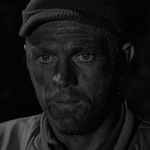 HELL IS FOR HEROES is a tight little black and white Don Siegel war movie that I watched because of that Village Voice piece I just did about the McQueen/Marvin/Bronson/Brown film series it’s playing in later this week. To tell you the truth I don’t watch too many war movies, and I don’t really have a desire to get more into them, but I liked this one.
HELL IS FOR HEROES is a tight little black and white Don Siegel war movie that I watched because of that Village Voice piece I just did about the McQueen/Marvin/Bronson/Brown film series it’s playing in later this week. To tell you the truth I don’t watch too many war movies, and I don’t really have a desire to get more into them, but I liked this one.
It’s about a platoon of American soldiers in Montigny, France, 1944. They’ve been hanging out in this “rest area near the Siegfried Line,” waiting to go home. You got your eccentric goofballs: Corby (Bobby Darin) is a talker and hustler who carries around a bunch of junk and prides himself on being able to get people whatever they need. He’ll tell you all about it. Henshaw (James Coburn, HARD TIMES, DEADFALL, ERASER) is some kind of mechanical genius. He seems to keep his mind occupied by puzzling over how machines work. In the opening he has a car dismantled and Sergeant Pike (Fess Parker, THEM!) asks what was wrong with it. “Oh, I don’t know,” Henshaw says, seeming to have not considered that question. Also there’s Homer (Nick Adams, REBEL WITHOUT A CAUSE, FRANKENSTEIN CONQUERS THE WORLD), a young Polish guy who clings on to the soldiers, runs errands for them and dearly wishes to join them in hopes that he can go back to the States with them.
Into this hangout movie is transferred Reese, played by Steve McFuckingQueen. Pike knows him and trusts him as a soldier, but he’s trouble. He walks in with his rucksack and an air of superiority, finds his corner and minds his own business until he sneaks off to get a late night drink even though it’s strictly forbidden.
Everybody in the bar can tell he’s trouble. The bartender insists she’s not allowed to serve soldiers today, so he goes behind the counter and gets a bottle for himself. The two allowed-to-be-served customers see where this is headed and call it a night, so she’s left alone with him. I know this isn’t a war part, but this is my favorite scene. Quiet and sad and I feel for him even though he’s being a jerk. This is one of a couple McQueen roles between THE MAGNIFICENT SEVEN in ’60 and THE GREAT ESCAPE in ’63, so he absolutely has that suave badass vibe we know him for, but much more haunted than usual. When you hear about him almost getting court martialed for stealing a Jeep it sounds like cool righteous rebellion, a Casey Ryback punching his superior kind of deal. But look in his eyes and you know this guy is troubled. He’s really good at war, but he’s not feeling good about it.
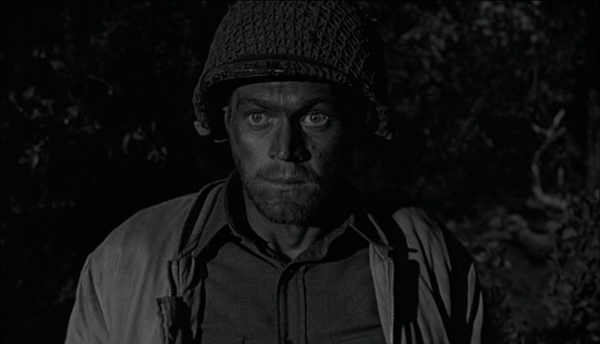
They all think they’re about to go home, but really they’re going back to the line. Not only that but our guys get the short end of the stick, they’re assigned to cover an area without anywhere close to enough guys. Everybody knows it but there’s nothing they can do about it. So the primary military objective of the movie is to keep the Germans from discovering that this section is under-protected.
They come up with some good tricks to make noise, including a Jeep that Henshaw jerry-rigs to backfire so it will sound like a tank. They get the Jeep from none other than Bob Newhart, or Driscoll, the character he’s playing, anyway. He gets an “and introducing” credit and he plays a secretary who’s completely lost trying to get back to division headquarters. He enters the movie saying “Hiya, fellas!” moments before a bomb just misses him and causes him to crash into a tree. He has to stay with them because they commandeer his vehicle for their plan.
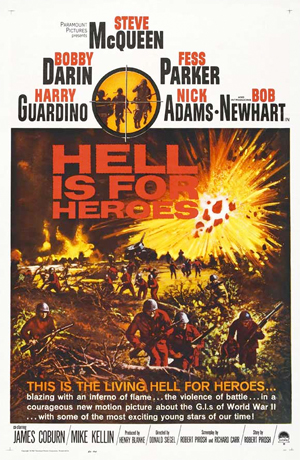 Luckily he’s the perfect guy for another plan when they discover a German bug hidden in the pillbox they’ve been using for shelter. They want whoever’s listening to believe the Americans are in control, so he has to make up fake conversations for them to hear. Can you see where this is going? He spends most of the movie doing his famous phone conversation routine, faking one side of the conversation so you can imagine the side you’re not hearing.
Luckily he’s the perfect guy for another plan when they discover a German bug hidden in the pillbox they’ve been using for shelter. They want whoever’s listening to believe the Americans are in control, so he has to make up fake conversations for them to hear. Can you see where this is going? He spends most of the movie doing his famous phone conversation routine, faking one side of the conversation so you can imagine the side you’re not hearing.
“This is Lieutenant, uh, Driscoll. The, the, uh, entertainment officer. About the morale, sir. Uh, it’s– it’s been rather low. Uh, the main complaint seems to be about the evening movie. Yes, sir. I’ve had to show, uh, ROAD TO MOROCCO now five evenings in a row, sir. Well, uh, the men are beginning to get a little surly, sir. Yes sir, they know all the lines.”
And he argues with another imaginary superior, begging him not to send anymore men because they already have too many.
It occurs to me that this is a couple years before DR. STRANGELOVE, where Peter Sellers is very funny using the same format. I had to look it up, and I learned that Newhart started doing these routines in the late ’50s while working as a copy writer. He started making tapes and sending them to radio stations as a sort of demo reel. Although he was new to movies, he was already a star – The Button-Down Mind of Bob Newhart (1960) was the first comedy album to hit #1 on the Billboard charts, and it also won the Grammy for album of the year!
HELL IS FOR HEROES a good ensemble, but it’s definitely a Steve McQueen movie. And with modern eyes it kind of plays as a commentary on action movie hero tropes that became popular later. I grew up on movies where the authorities are wrong and one guy, like McClane or Rambo, has to defy them and do it his way to save the day. Reese tries to do that and (SPOILER) gets somebody killed. It turns him into a total mess. McQueen is really good silently contemplating his terrible mistake, his eyes wide, his chest heaving. He redeems himself but at great cost.
ANOTHER SPOILER COMING
I guess it’s not a big deal to spoil a character death in a movie thats more than 50 years old. There’s a visual touch I really liked and wanted to call attention to. When we meet Henshaw the most noticeable visual characteristic is his round spectacles.
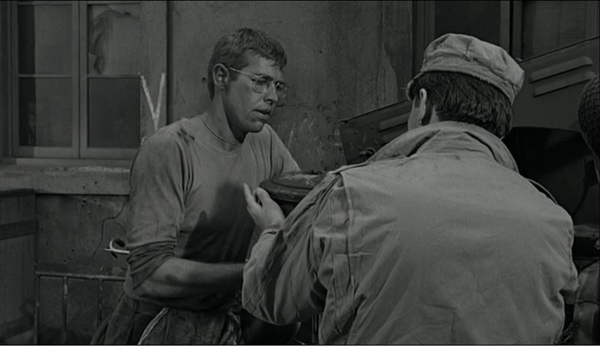
None of the other characters have glasses, and Coburn doesn’t usually have them, and through stereotypes it helps the character seem brainy.
And then when tragedy strikes, there’s a shot of him dying, and they are still the most striking part of the image, because they’re cracked, and the only white in the frame.
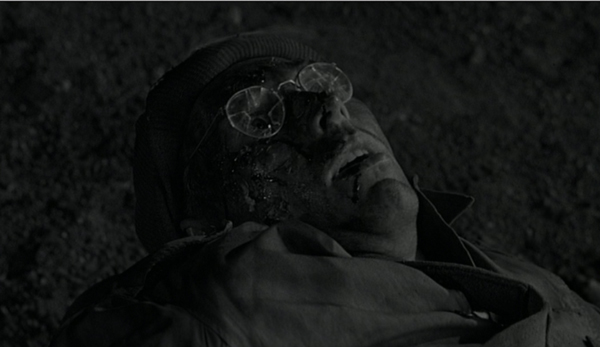
Good one, Don Siegel. This was his movie between working with Elvis on FLAMING STAR and Lee Marvin/Ronald Reagan on THE KILLERS. The guy knew how to make sturdy, unpretentious movies with some grit and some heart to ’em. This is no exception.


























April 2nd, 2018 at 9:57 pm
Good of you to write this up, I was just thinking about this last week on McQueen’s birthday. Screenwriter Robert Pirosh went on to create the WW2 series COMBAT! and this movie could have fit neatly into the template it established. McQueen would have been the special guest star, freshly transferred into the unit and be the catalyst for that week’s episode, which would be resolved by having him killed or wounded and evacuated away to be never talked about again.